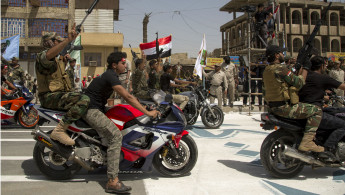The law of the street rules militia-controlled Iraq
A coalition of Iraqi militia groups, al-Hashd al-Shaabi, has enacted a strict code of law over parts of Baghdad and southern Iraq under its control.
These laws in some way mirror the hardline measures enforced in north and west Iraq by the Islamic State group (IS, formerly known as Isis).
The Baghdad government appears as powerless as residents to stop the imposition of such "laws", let alone the dismemberment of Iraq into cantons under the control of militias.
These same armed groups form an important part of the government's security services.
The 41 militias affiliated to al-Hashd al-Shaabi, which is understood to receive funding from both the Iraqi and Iranian governments, have distributed the new code across southern Iraq.
They have banned alcohol, smoking, drugs and certain hair styles.
In areas under al-Hashd al-Shaabi control, it is now compulsory for women to cover their hair.
Women are also prohibited from driving, playing sports in schools and mixing with men in universities. Being found "guilty" of being gay results in the death penalty.
This militia-written code is being enforced despite the strong presence of Iraqi police, military and judiciary in the area.
Since the US-led invasion of Iraq, political parties have used local militias to strengthen their influence and rally popular support during elections.
A police officer who spoke on condition of anonymity told al-Araby al-Jadeed that militia groups had started to bomb shops that sell alcohol.
"The militias have blown up 12 liquor stores, shut seven night clubs in a week, and [abducted] popular local singers," he said.
| They have taken up the role of Islamic police... We do not have the authority to stop them. - Baghdad police officer |
"They have taken up the role of Islamic police and have even gone to universities and prevented the mixing of students, carrying out extreme punishments. We do not have the authority to stop them."
The police officer said that the militias had handed out pamphlets listing their regulations. These are more closely obeyed than the country's actual code of law, as transgressing the armed groups' rules could ultimately mean imprisonment, torture and death.
Extrajudicial punishments
It is not uncommon to see people dragged out of their homes by militants, and the policeman said these groups have "eyes everywhere".
"The government has not thought of putting an end to the militias' crimes and infringements to personal and civil liberties because they have over a million pieces of heavy and light weaponry and are taking part in the war against IS," he said.
"The government thinks an armed conflict with the militias would open up a new battlefront that could bring down Haider al-Abadi's government or the parliament as a whole."
Militants have also ordered hundreds of families to leave areas under their control with a simple method - sending them a warning letter with a bullet attached.
These are sent to families who oppose the militias or belong to different sects to these Shia-dominated militias.
"The militias' power is expanding, their legal sentences are harsh and the government is unable to stop them," said Ziad al-Barakat from Iraq's Communist party. "Iraqis have no choice today but to flee the country or live under the rule of the militias or IS."
Two militia groups, al-Asaib and Badr, recently killed a number of gay men in Baghdad's Shia-majority district of Sadr City. Their heads were smashed in with large rocks.
In Mosul, IS fighters execute gay men by throwing them off high buildings.
The extrajudicial actions of these militias led a coalition of Sunni-majority parties and the national bloc to call for a boycott of parliament until the government reins in the fighters and stops the "the unrestrained crimes of the militias".
Their protest lasted two weeks until Abadi pledged to restrict the activities of the militias.
With the daily sight of unidentified corpses on streets, in rivers and under bridges in Baghdad, the militants don't appear to be taking the prime minister's authority seriously.
This article is an edited translation from our Arabic edition.



